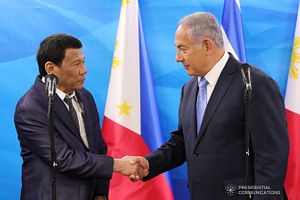From September 2 to 5, Philippine President Rodrigo Duterte paid the first-ever visit by a Philippine president to Israel since bilateral ties were first established over six decades ago. As expected, the historic trip provoked deep controversy given Duterte’s previous words and actions even as both governments continued their attempts to forge closer ties in the defense realm.
Despite concerns around Duterte’s drug war and some of his offensive remarks – which included an infamous comparison of his drug war to the Holocaust in 2016 – the Philippines and Israel have been making some inroads in the defense realm over the past few years. The Armed Forces of the Philippines (AFP) has placed orders for a range of equipment, including missile systems, armored personnel carriers, and radars, from several Israeli firms. Both sides have also quietly been exploring ways to broaden security cooperation across several areas as well in the coming years, with their interests converging even more in the wake of developments such as the five-month long siege by Islamic State-backed militants of the southern Philippine city of Marawi last year.
Duterte’s historic visit to Israel over the past week – the first by a Philippine president since the establishment of bilateral ties back in 1957 – was expected to provide an opportunity for both governments to advance ties still further, even though this would have to be done cautiously due to fierce opposition within some in Israel about doing so due to some of Duterte’s words and actions. The defense side of the trip in particular was expected to be a careful balance to walk, given that media headlines ahead of the visit had already bluntly raised the question of why Israel was advancing security ties with a serial human rights violator and suspected anti-Semite.
During the trip, Duterte himself unsurprisingly showed little regard for walking a careful balance between these considerations. On Tuesday, in another one of his characteristic hyperbolic statements, he told Israeli President Reuven Rivlin that when it came to military equipment, he had ordered his military that Israel was the only “one country to buy from.” In fact, despite Israel being a partner for the Philippines on the defense side, Manila also continues to maintain a series of other relationships for those purposes as well. Nonetheless, that one comment itself made headlines and only increased the scrutiny on the defense side of the relationship.
Notwithstanding, officials on both sides did their part to emphasize the all-round nature of ties and downplay defense-related developments. Emphasis was given to people-to-people engagements during the visit such as Duterte’s tour of the Yad Vashem Holocaust Memorial Center in Jerusalem, as well as the deep history of ties, be it in a visit to a monument commemorating Manila’s role in the rescue of the Jews during the Holocaust under then-President Manuel L. Quezon, or the presence of Duterte’s daughter Sarah Duterte-Carpio, the child of his first wife, Elizabeth Zimmerman, who is of Jewish-American descent. And in their meetings with Duterte, Rivlin as well as Prime Minister Benjamin Netanyahu both emphasized the longstanding nature of bilateral ties that extended beyond Duterte as well as Israel’s democratic values.
Yet there were defense-related developments on the trip as well, even though these were not emphasized as much by both sides and were not messaged as big-ticket arms deals that would have drawn more attention. Within the full list of agreements inked provided by the Philippine government, six pacts were security-related. These included two memorandums of understanding (MOUs) on intelligence data mining and cybersecurity; three memorandums of agreement (MOAs) on tactical vehicles, technology transfer, and developing various intelligence and military products; and one letter of intent (LOI) on small arms and ammunition.
Beyond agreements, some of the engagements also shed light on areas for further security-related cooperation between the two sides. For instance, upon viewing a simulation of Israel’s natural disaster response and rehabilitation system, led by Magen David Adom (MDA) which is the national organization responsible for efforts in this realm, Duterte indicated that having similar technology could be beneficial for the Philippines, which remains one of world’s most disaster-prone countries. While he was not specific on exactly what that might constitute, he did note Philippine needs in areas such as better transportation networks and training of personnel.
Media attention was also focused on what agreements might not have been signed and what that means for the state of defense ties. For instance, reports surfaced in Israel during the visit indicating that a deal to expand police cooperation between Tel Aviv and Manila had been put on hold due to concerns among parts of the Israeli government about Duterte’s drug war. While collaboration could still eventually move ahead, it nonetheless once again highlighted the ongoing challenges both sides face in concretizing some of their planned efforts.
To be sure, these public engagements are not the sum of what both sides have agreed to and are exploring on the defense side – there were other matters and discussions that were intentionally kept private. But in general, it was clear that though Duterte’s trip indicates that both Israel and the Philippines are still keen to make progress on the defense side of ties given their converging strategic interests as well as the gains that each can realize, it also illustrated the lingering difficulties they face in doing so. How both sides continue to balance the opportunities and challenges they face to realize the collaboration they intend for their security relationship will be the key question in the coming months and years.
































